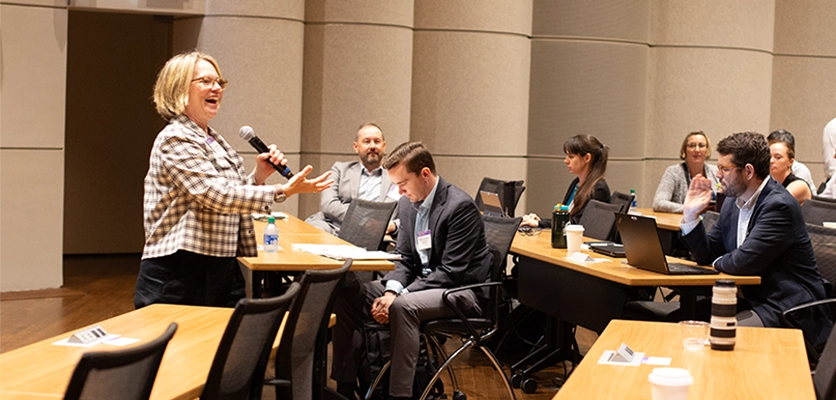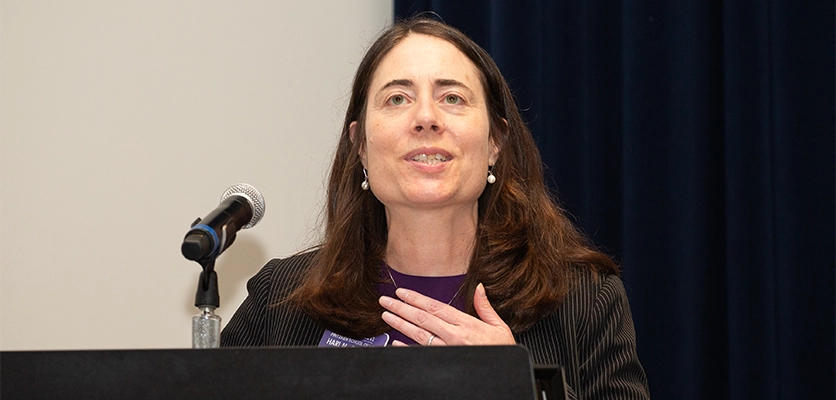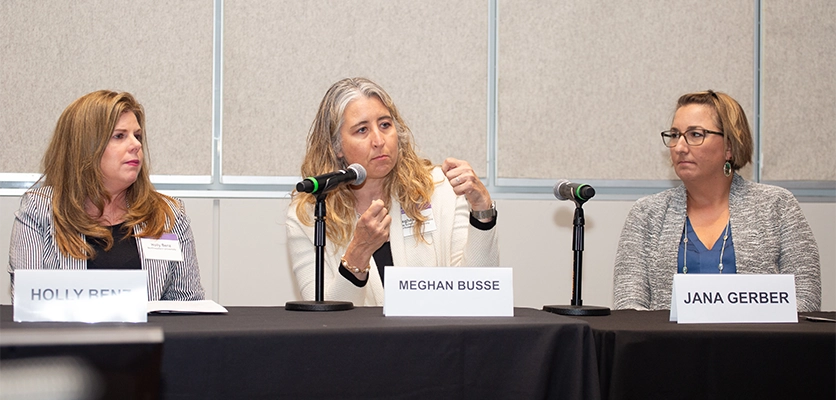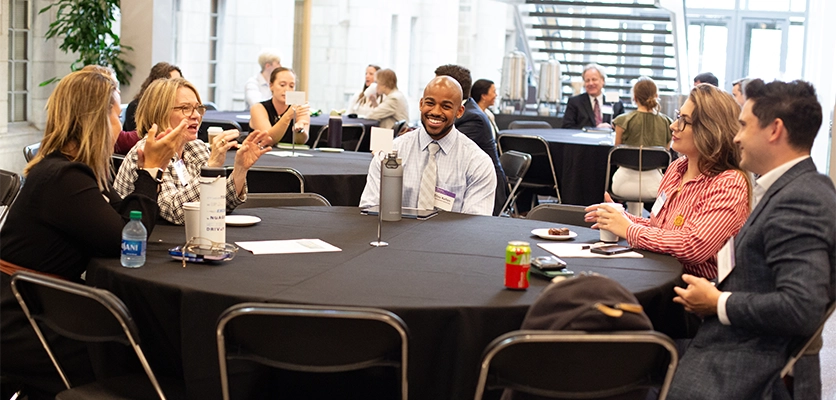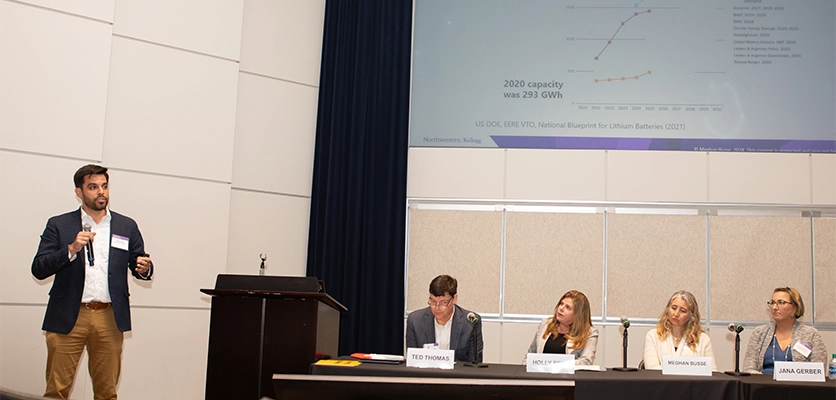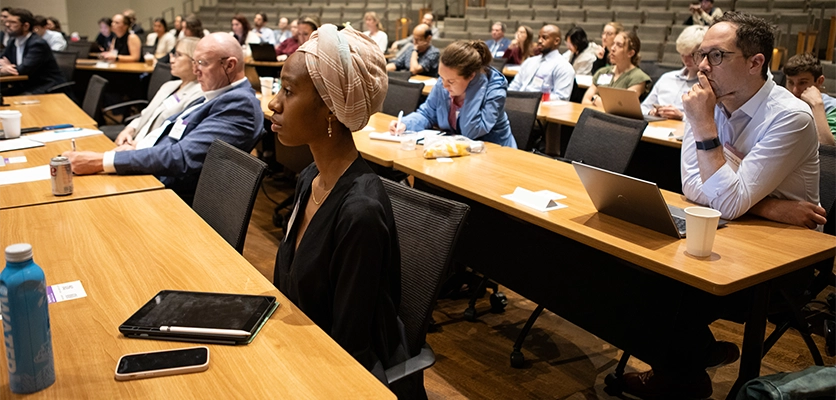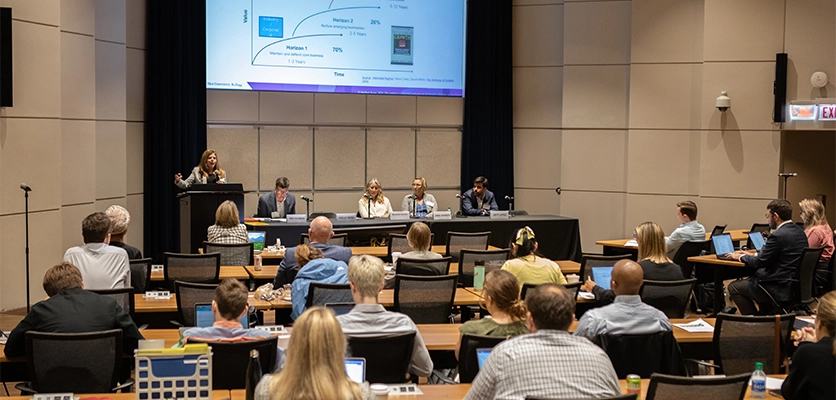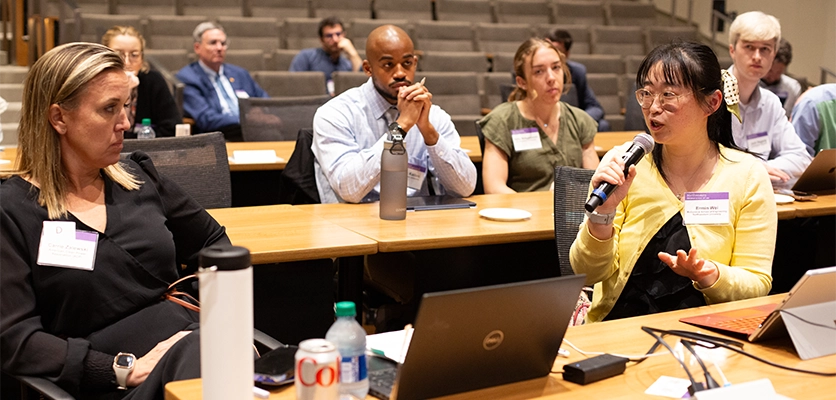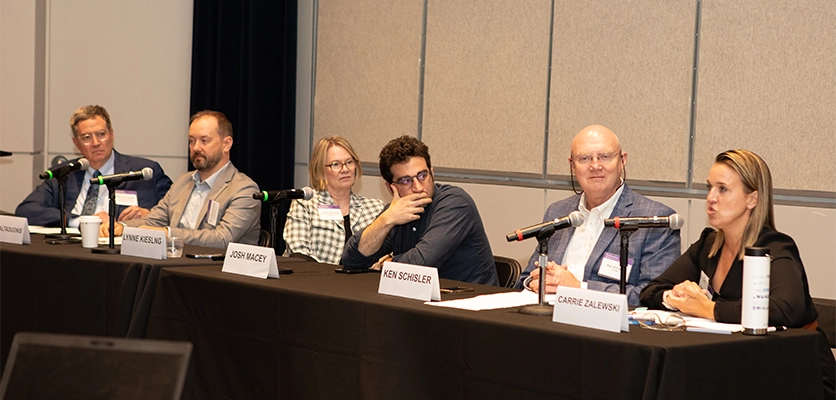The first panel, New Technology Breakthroughs: Their Physical and Economic Implications, was led by moderator Ted Thomas, Founder of Energize Strategies and former chairman of the Arkansas Public Service Commission. Panelists included Meghan Busse, associate professor of strategy at the Kellogg School of Management, Holly Benz; clinical associate professor and Director of the Master of Science in Energy and Sustainability, Jeff Lopez, assistant professor of chemical and biological engineering; and Jana Gerber, President of Microgrid North America at Schneider Electric.
“In order for decarbonization innovations to achieve their potential, policy makers, scientists and engineers have to understand what drives implementation by firms,” said Busse, noting that if academia develops innovations, they do not have an impact unless they are adopted.
Yet, many obstacles exist on the path to implementation. Businesses are often challenged to generate a profit when offering an innovative new product or service. Busse encouraged the room of law students, business and non-profit leaders and academics, to consider how firms think about adopting innovations across the energy sector and the role played by incentives and subsidies among other approaches.
“Innovation is vital to get us to make progress on the climate transition,” said Benz, who discussed the need to reach key benchmarks on the way to the 2050 goals set in the Paris Agreement. “We have most of the tools, technologically speaking, to get us to 2030. That’s great news, but we need business and policy in place to push adoption.” Benz shared that the reporting timeframe for most businesses is also shorter than the amount of time it takes to adopt a new technology and derive a profit from it, which presents another challenge to implementation. An additional challenge to consider, she added, is that “the people who are usually hit hardest by climate issues are the ones without the power to drive change.”
Speaking on behalf of the research community, Lopez addressed the importance of translating what is done in the lab out into the real word and setting it up have an impact. Scientists and researchers look toward economic and regulatory incentives to identify problems that need to be addressed, he said. In addition, they think about developing and sharing new technology in response to technology and market signals. He referenced the example of lithium ion battery production. An explosion in demand led to an increased call for materials. This led scientists to move away from materials such as cobalt that are challenging to source, in place of materials such as nickel. “That basic science is really critical here, we need to incentivize all stripes of research as we are doing this work,” said Lopez.
Gerber discussed the need to facilitate local microgrids to support an increasing customer demand during this ‘electrical revolution’ in the fight against climate change. “We are facing a triple crisis – energy security, a fragile global economy, and a rapidly changing climate,” she said. “It’s all about changing it from the grid all the way to the plug.” Microgrids, she explained, offer resilience, like a power plant behind the meter.
After a detailed discussion, attendees gathered to hear from a second panel, the IRLE 20th Anniversary Panel: Regulatory Decision-Making in a Changing Environment. The panel was led by moderator Pat O’Connell, commissioner of the New Mexico Public Service Commission. Panelists included Rim Baltaduonis, scientist at the SLAC National Accelerator Laboratory at Stanford University and an associate professor of economics at Gettysburg College, Lynne Kiesling, Josh Macey, assistant professor of law at the University of Chicago Law School, Ken Schisler of regulatory and government affairs at CPower, and Carrie Zalewski; Vice President of Transmission and Markets at the American Clean Power Association.
The panel shared reflections from prior experience at the IRLE Annual Workshop for Regulatory Law and Economics, and how they have applied their insights. Kiesling explained that the workshop teaches regulators to apply the IRLE intellectual foundations for the practice of regulation, called the five prisms. The prisms are: neoclassical economics, innovation and dynamism, institutional and organizational economics, public choice economics, and the innovator’s dilemma. The next annual workshop will take place from September 27 to October 1, 2024 in Aspen, Colorado.
Former state regulator Zalewski, an adjunct professor of law at Northwestern where she teaches a course on clean energy law, explained that the role of commissioner is fast paced, often leaving little to no time for learning on the job as new issues arise. Therefore, she said that the five IRLE prisms are often in her thoughts as she navigates rapid change in her industry.
The symposium’s first day continued with a keynote by U.S. Congressman Sean Casten, 6th District of Illinois. The second day featured a panel on Science, Economics, and Policy Lenses on Transmission Investment, and short presentations on Energy System Resilience Issues along with discussion opportunities.
Other speakers included:
- Kyri Baker, Assistant Professor and Lewis-Worcester Faculty Fellow, Civil, Environmental, and Architectural Engineering, University of Colorado Boulder
- Timothy Fitzgerald, Associate Professor, Rawls College of Business, Texas Tech University
- Jacob Mays, Assistant Professor, Civil and Environmental Engineering, Cornell University
- Ann McCabe, Commissioner, Illinois Commerce Commission
- Hari Osofsky, Dean and Myra and James Bradwell Professor of Law at Northwestern
- David Rankin, Executive Director, Great Lakes Protection Fund
- Karthik Rao, VP of Customer Success, LineVision
- Jim Rossi, Judge D.L. Lansden Chair in Law, Vanderbilt University Law School
- Shashank Sane, EVP Transmission, Invenergy
- Ermin Wei, Associate Professor, Computer and Electrical Engineering, McCormick School of Engineering, Northwestern University
- Pat Wood, III, CEO, Hunt Energy Network; Former Chairman of the Federal Energy Regulatory Commission, Former Chairman of the Public Utility Commission of Texas
The partnership between the event organizers, Northwestern Law's Center for Law, Business and Economics (CLBE) and the Trienens Institute, is ongoing. The Institute's support of IRLE, which includes organizational and programmatic sponsorship at CBLE, is among its most recent projects with Northwestern Law. Trienens Institute support of Northwestern Law extends to partnership work between the Environmental Advocacy Clinic (EAC) and global partners including The Nature Conservancy and World Wildlife Fund. The Trienens Institute is also proud to count a number of Northwestern Law professors among its growing list of faculty affiliates, who each bring critical insights into public policy, regulation, and advocacy to the Institute mission to advance global energy and sustainability solutions through transformational research, interdisciplinary education, and public engagement.
